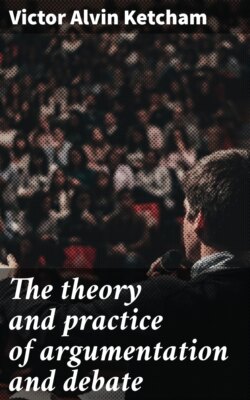Читать книгу The theory and practice of argumentation and debate - Victor Alvin Ketcham - Страница 20
На сайте Литреса книга снята с продажи.
4. The proposition should be worded as briefly and simply as is consistent with the foregoing requirements.
ОглавлениеAfter the proposition has been worded in accordance with the foregoing rules it should be carefully scrutinized to determine whether or not there is a simpler form in which it may be cast without sacrificing any of its excellencies. The simpler the wording of the proposition the easier will be the work of determining the main issues and the subsequent work of preparing the argument.
In dealing with broad general problems such as questions of finance, commerce, and taxation, it sometimes happens that some issue is brought in which is aside from the real merits of the controversy and yet so vitally connected with it as to be logically inseparable. Either side may present such material, with disastrous results if their opponents have dealt solely with the real merits of the controversy. An instance of this difficulty appeared in the debates of one of the Inter-State leagues. For three or four successive years the questions chosen for the annual debates were of the character indicated above. In many of the debates one or the other side of the controversy would bring up the constitutionality of the proposed measures. The charge would be made that the proposition could not be decided in the affirmative because the proposed measure was contrary to the constitution of the United States. In almost every case this question vitally affected the final adoption of the resolution, although it could well be excluded from a discussion on the merits of the problem. The question was especially exasperating, inasmuch as the judges for the debates were almost always selected from the bench of the Supreme Court of the states composing the league and from the Federal Courts. It was finally determined by the official board of the league to append the phrase “Constitutionality conceded,” to all propositions in which there was any likelihood that the question of constitutionality could be made an issue. Thus in one instance the proposition adopted was, “Resolved, that the Federal Government should levy a progressive inheritance tax. Constitutionality conceded.”
This did not in any way interfere with the simple wording of the proposition, and it did effectually prevent the debate from hinging on an issue which would have prevented a full discussion of the merits of the question. This method of excluding undesirable matter is preferable to an attempt to include any restriction in the body of the proposition. The latter method is quite likely to lead to difficulties, in the form of ambiguities and their attendant evils, almost impossible to foresee when the proposition is framed.
In conclusion, the debater must not forget that time spent in selecting a proper subject and wording it in accordance with the foregoing rules is time well spent. It will make the great task which lies before him much easier, and it will enable him to arrive at definite conclusions.
SUMMARY OF REQUIREMENTS FOR WORDING THE PROPOSITION
1. The proposition should be so narrowed as to embody only one central idea.
2. The proposition should be stated in the affirmative.
3. The proposition should contain no ambiguous words.
4. The proposition should be worded as briefly and simply as is consistent with the foregoing rules.
EXERCISES IN SELECTING AND PHRASING THE PROPOSITION
1. Write out three propositions in accordance with the rules stated in this chapter. The subject-matter of these propositions should be purely local in character as suggested in the first and second sections.
2. Phrase, in proper form, one proposition on each of the following subjects.
A. Sunday baseball.
B. Interstate commerce.
C. Labor unions.
D. United States Senators.
E. Prohibition.
F. Reciprocity.
3. Apply the appropriate rules to each of the following propositions and point out where each is defective.
Resolved, that—
A. We derive more pleasure from hope than from memory.
B. Wit and humor are the same.
C. Education ought to be compulsory.
D. The law is a better profession than medicine.
E. The Federal Government should levy a tax on large incomes and limit the amount of wealth which one man may possess.
F. It is expedient for the United States to build a larger navy.
